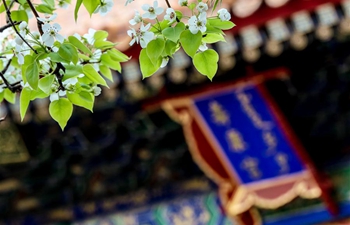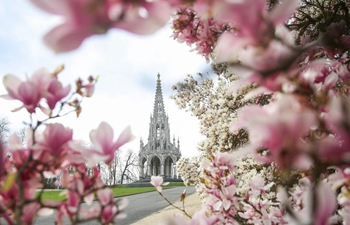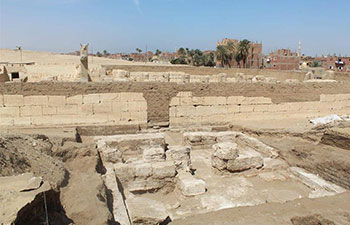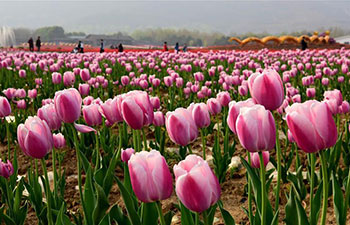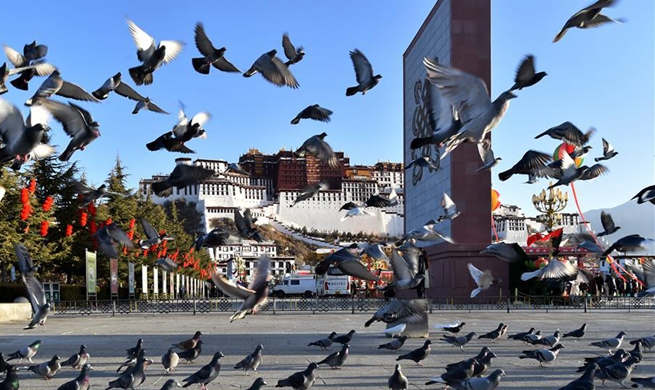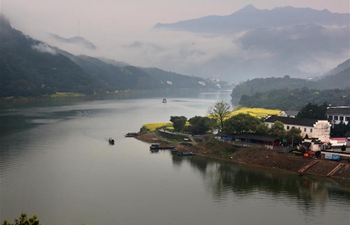LHASA, March 29 (Xinhua) -- As rays of the Himalayan morning sunshine pour on its golden roof, the Potala Palace begins its daily routine as a magnet for thousands of visitors while being looked after by its dedicated staff.
At 8:30 a.m., visitors have already started to line up at the southern gate of the imposing palace dating back 1,300 years ago. More than 400 palace staff are also in place.
At 9 a.m., when the gates open, the staff remind visitors that they can use security checks at the left and right and to mind their steps when they move forward.
Tenzin Doje, 34, is the deputy head of management at Xuecheng, a 50,000-square-meter architecture complex at the foot of the Hongshan, or the Red Hill, where the palace is situated.
He wears a big smile when he oversees staff at security checks. "The responsibility of working in the palace is heavy, but it's an honorable job to guard the icon of Tibetan culture," he said.
In 2018, the Potala Palace received 1.6 million tourists from all over the world, up 16 percent year on year.
A maximum of 5,000 people are allowed per day during the high season, and visitors have to reserve tickets in advance and are given a specific entrance time, in 20-minute intervals.
"The east and southern gates are open at the same time every day to allow the visitors to pass through," said Tenzin Doje.
The Potala Palace, covering 130,000 square meters, is the largest and best-preserved palatial structure in Tibet. Its main building is 115.7 meters high.
Losang Chodrak, 54, has worked at the palace as an incense master for 24 years. For him, it is a place to work as well as to practice his religious beliefs as a lama.
Every morning, lamp and incense staff like Chodrak draw the yellow curtains in each hall to allow sunshine through the windows.
Before the visitors come, they clean the halls, check if there are safety hazards, and add water and incense and light up the butter lamps. Each of the halls that are open to the public has at least two incense staff.
"The palace is like a very old person. Everything, the paintings, and the wooden beams require careful protection. When a place becomes over-crowded, I get worried, and I need to guide guests forward so they don't damage any of the structures," said Losang Chodrak. "The palace is the wisdom of the ancestors of the Tibetan people, and a part of human civilization. Each person working in the palace is dedicated to guarding its peace."
The Potala Palace is a model of ancient architecture and home to over 100,000 pieces of cultural relics. It was listed as a key national cultural relic in 1961. A 300-million-yuan project is underway to preserve the old books at the palace.
Tashi, 41, head of security at the palace administration, has worked in the palace for 21 years.
In 1984, a fire that broke out at one of the halls sounded an alarm for the protection of the buildings.
"The palace is equipped with advanced digital alarms covering almost every corner. A patrol team works 24 hours a day to make sure of its safety," Tashi said. "In terms of safety hazards, no matter is too small at the palace. Precision is required. For example, the staff have to know how many lamp wicks are in one butter lamp."
Each afternoon after the palace is closed to the public, a 20-person team, from the security, water and electricity, fire-prevention, incense management and repair divisions patrol all the halls and yards.
"Our biggest mission is to make sure the palace is well-protected, and that we pass this tradition down to the next generation," said Tashi.




